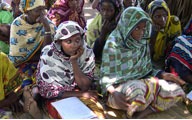
Helping Tanzanian Smallholder Farmers Grow Maize and Rice
RELATED NEWS
Summary
The NAFAKA Staples Value Chain Activity was a five-year task order issued by USAID under the Tanzania Feed the Future (FtF) initiative and administered by ACDI/VOCA. NAFAKA integrated agricultural, gender, environment, and nutritional development efforts to improve smallholder farmer productivity and profitability within the rice and maize value chains in Morogoro (Kilombero and Mvomero Districts), Dodoma (Kongwa District), Manyara (Kiteto District), Mbeya, and Iringa on the mainland, as well as Pemba and Unguja in Zanzibar. NAFAKA’s goal was to sustainably reduce poverty and food insecurity by increasing incomes for smallholder farmers, including men, women, and youth.
Objectives
- Increase smallholder productivity and income from rice and maize farming
- Increase adoption of new technologies (inputs, agricultural practices) by smallholder farmers
- Expand the depth and breadth of benefits from the growth of the maize and rice subsectors, including increased benefits to women and youth
- Increase private sector investment in smallholder agriculture
- Facilitate improved domestic and regional trade
Activities and Approaches
- Conducted local demonstrations of improved technology packages (seed, inputs, GAP) in rice and maize chains
- Improved sustainable access to farming information and inputs through village-based agents linked to commercial agrodealers
- Strengthened farmer associations
- Developed savings and internal lending community groups, savings and credit cooperatives, and contracted farming models to bring sustainable production finance to smallholders
Results
- 210 percent increase in rice yields
- 12 percent increase in maize yields
- 92,665 individuals have received agricultural training
- 81,243 farmers are applying new technologies
Funder:USAID



